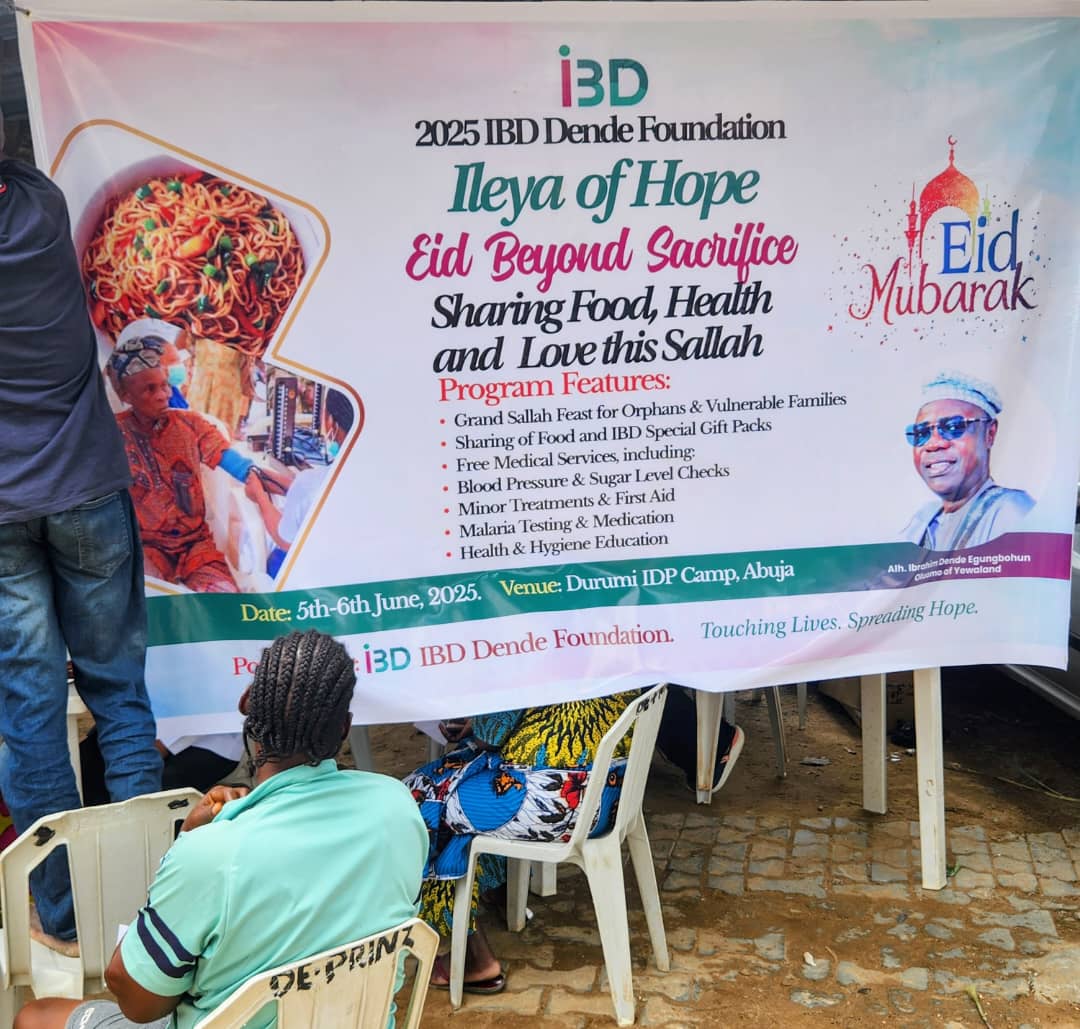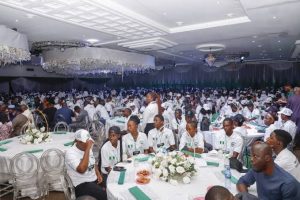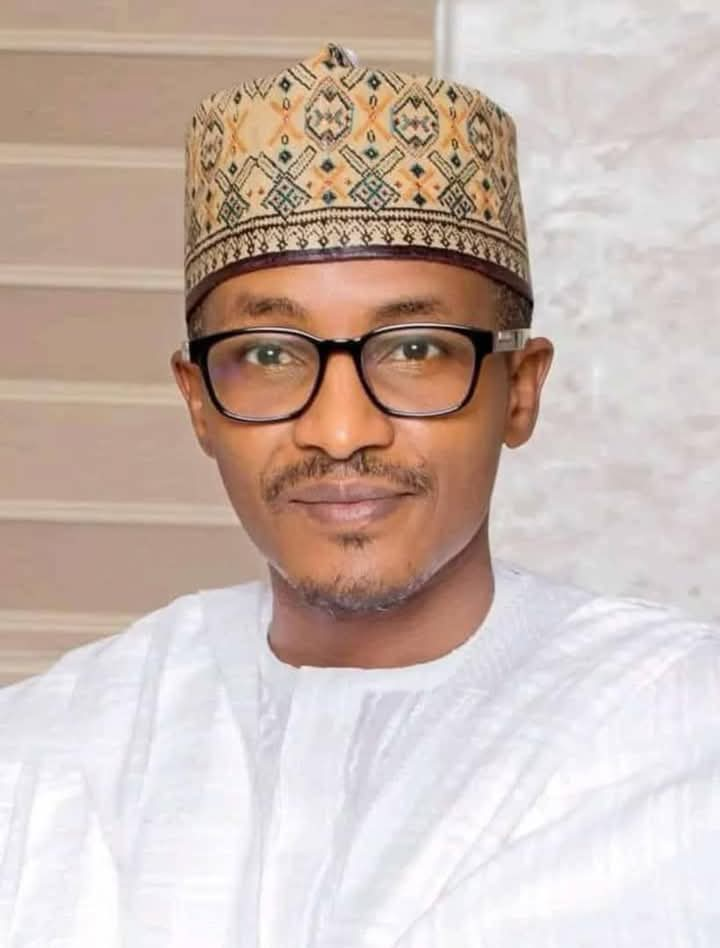News
Kwara youths applaud Senator Saliu Mustapha’s infrastructure drive

Northern Women Forum (NWF) has expressed satisfaction with the overall performance of Senator Saliu Mustapha, who represents Kwara Central Senatorial District in the National Assembly.
The group made this known on Sunday while assessing the lawmaker’s contribution to the development of Kwara through quality representation, facilitation of empowerment and constituency programme as well as promotion of women’s inclusion in the grand scheme of things in Nigeria.
In a statement in Ilorin on Sunday, NWF President Awakulu Mafaji described the Turaki of Ilorin as a trailblazer who is living up to expectations of the the people. Noting that he (Mustapha) has demonstrated a paradigm shift in the area of empowerment of constituents and by extension, the electorate.
Mafaji specifically lauded Senator Mustapha’s recent donation of new tractors to Hausa farmers across the four local government areas in Kwara Central—Ilorin West, Ilorin East, Ilorin South, and Asa—describing it as a “rare gesture.”, while welcoming Senator Saliu Mustapha’s call for increased participation of women in politics and decision-making at all levels during this year’s International Women’s Day celebration.
“We have watched Senator Mustapha keenly and closely and followed his antecedence and it’s clear that Kwara has been blessed with an extraordinary political leader that is blazing the trail and setting the pace for others to follow.
“Despite being a good ambassador of Kwara state, Senator Mustapha has shown quality in his representation of the North-central state. He is not part of shoddy deals and corruption in the hallowed chamber.
“In delivering service to his people, the lawmaker who chairs the Senate Committee on Agriculture Production Services and Rural Development, has attracted multi-billion-naira agricultural and rural development projects to his district.
“His efforts have been credited with boosting food production, empowering rural farmers, and improving livelihoods across the senatorial zone. His donation of new tractors to Hausa farmers across the four local government areas in Kwara Central is already boosting large-scale farming and will translate to an economic boom to the state.”
The group also recalled an empowerment programme organised by Senator Mustapha earlier in the year, tagged, Alubarika 1.0 Agricultural and Human Capital Development Empowerment Programme which was regarded as historic as beneficiaries cut across the four local governments of Kwara Central.
The beneficiaries included artisans, market women, indigent students in universities, and several youths, products of the lawmaker skills acquisition programme. In addition, indigent students in the lawmaker’s constituency received scholarships.
It is however worthy of note that apart from the provision of scholarships to over 200 indigent students in universities, empowerment items distributed to beneficiaries included, 20 tractors, to be shared among the four local governments, 10,000 bags of fertilizer, 30 complete industrial rice milling equipment, 25 complete Garri processing machines, all to assist farmers and boost agricultural produce.
Artisans trained in tailoring and designing went home with Butterfly sewing machines (200) Industrial sewing machines, (55) and Gas-Powered Pressing Irons (100). Those trained in solar installation were given complete Solar Installation equipment while over 100 butchers were given one life cow each.
News
IBD Dende Foundation Uplifts Residents with “Ileya of Hope” Outreach in Abuja

In a powerful demonstration of compassion and community service, the IBD Dende Foundation marked this year’s Eid al-Adha celebration with a two-day humanitarian outreach tagged “Ileya of Hope: Eid Beyond Sacrifice” at the Chief’s palace in Durumi, Abuja. Held from June 5th to 6th, 2025, the initiative aimed to share food, health, and love with those in need, in the true spirit of the season.
The event, powered by the IBD Dende Foundation under the leadership of its founder, Alhaji Ibrahim Dende Egungbohun, brought smiles to the faces of the beneficiaries. This year’s program, themed “Eid Beyond Sacrifice”, went beyond the rituals of the Sallah celebration by offering tangible support through a combination of humanitarian relief and free medical services.
Hundreds of beneficiaries were treated to a grand Sallah feast, where items were shared in a festive atmosphere filled with gratitude and joy. In addition to the feast, the foundation distributed special IBD-branded gift packs and food items to families, ensuring that no one was left out of the celebration. The outreach also included a comprehensive range of free medical services such as blood pressure and sugar level checks, minor treatments, first aid, malaria testing, medication, and health education sessions focused on hygiene and wellness.
Volunteers and health professionals from the Support and Help Outpatient Foundation SHOF, worked tirelessly throughout the two days, embodying the foundation’s mission of “Touching Lives, Spreading Hope.” A Representative from the IBD Dende Foundation, Dr. David Owah emphasized that the goal was not just to feed and treat people physically, but to uplift them emotionally and spiritually during a time that should be joyous for all.
“Eid is not just about sacrifice, it is about sharing. Our aim is to bring hope to these communities who have lost so much, and to remind them that they are not forgotten,” David Owah stated.
A beneficiary, expressed deep appreciation for the gesture, visibly moved by the support, said, “This is more than just food and medicine. It shows that someone cares. It gives us hope.”
The presence and leadership of Alhaji Ibrahim Dende Egungbohun continue to inspire similar acts of kindness across Nigeria, as his foundation remains committed to reaching out to the needy, especially during times of national festivity.
The “Ileya of Hope” outreach stands as a shining example of how faith-based philanthropy can play a critical role in fostering inclusion, dignity, and well-being in underserved communities. Meanwhile, as the nation celebrates Eid, the IBD Dende Foundation’s intervention serves as a reminder that true sacrifice lies in giving wholeheartedly to those who can offer nothing in return.
News
Otuaro’s Leadership Revives Amnesty Programme, Restores Stakeholder Confidence

• Two Years of Tinubu’s Renewed Hope Agenda Mark a Turning Point for the Niger Delta
• 5,000 Beneficiaries Empowered as Stakeholder Confidence Returns under Otuaro’s Leadership
As Nigeria celebrates the second anniversary of President Bola Ahmed Tinubu’s administration, the Presidential Amnesty Programme (PAP) stands out as a flagship success, reinvigorated under the purposeful leadership of Dr. Dennis Brutu Otuaro.
Appointed as Administrator in line with President Tinubu’s Renewed Hope Agenda, Dr. Otuaro has brought focus, vision, and integrity to a programme once plagued by uncertainty.

Previously seen as directionless and losing stakeholder trust, the Amnesty Programme has now returned to its core mandate of Disarmament, Demobilization, and Reintegration (DDR). Since taking office, Dr. Otuaro has led a transformation marked by transparency, youth empowerment, and inclusive engagement with ex-agitators and local communities.
Among his key achievements is the sponsorship of over 5,000 students across universities and skills acquisition centres. Hundreds more are undergoing specialized training in the blue economy, including marine logistics, aquaculture, and coastal enterprise, aligning the programme with global economic trends and regional potential.
In addition to educational and vocational empowerment, Dr. Otuaro has championed peacebuilding and reconciliation, reaching out to traditional rulers, community leaders, and civil society actors to rebuild trust and dialogue in volatile areas of the Niger Delta.
One of the most praised reforms has been the reintroduction of strict transparency and accountability frameworks, ensuring that funds are appropriately audited and disbursed to genuine beneficiaries. This renewed credibility has repositioned the Amnesty Programme as a model of public sector performance under the Tinubu administration.

Stakeholders across the Niger Delta say the changes reflect the spirit of the Renewed Hope Agenda. “Dr. Otuaro is restoring not just the programme, but our hope in government,” said a community elder in Delta State. “For the first time in a long while, we are witnessing real results.”
The transformation of the PAP is now widely recognized as one of the clearest indicators of President Tinubu’s commitment to inclusive governance, regional equity, and peacebuilding.
Observers believe that with sustained support, the programme could serve as a blueprint for national integration efforts across other restive regions.
In recognition of these achievements, the Niger Delta Transparency Watch Group, which has been monitoring public sector reforms in the region, commended both the Presidency and the Amnesty Office.
“We are proud to celebrate the results of effective leadership. What we see today is a Renewed Hope in action-driven by commitment, community engagement, and accountability,” the group stated.
As Nigeria looks ahead, the success of the Presidential Amnesty Programme under Dr. Otuaro is a powerful reminder that when leadership is anchored in integrity and service, national transformation becomes inevitable.
Business
NASC Backs Digital Push to Revolutionize Seed Sector

- Says Seed Tracker boosts traceability, adopted in three African countries
- Bt cowpea, global alliances key to Nigeria’s seed market expansion- DG
The National Agricultural Seed Council (NASC) has reaffirmed its commitment to driving innovation in Nigeria’s seed industry through the use of digital technology.
Speaking during a refresher training session for seed companies, licensed seed inspectors, and lead outgrowers, Director General of NASC, Fatuhu Muhammad, highlighted the strategic role of the Seed Tracker platform in strengthening the inspection and certification of crop seeds nationwide.
According to Muhammad, the platform has already gained regional traction, having been exported to Tanzania, Uganda, and Sierra Leone. He revealed that many more countries have expressed interest in adopting the technology, which has become a benchmark for seed system transparency in Africa.
“Over 52 seed companies have input data on the Seed Tracker on crops such as cassava, cowpea, yam, potato, rice, and maize,” he noted. “The platform, developed to enhance transparency and traceability in seed certification, is modernising Nigeria’s agriculture.”
As part of its strategy to improve efficiency and reduce operational bottlenecks, NASC plans to expand the use of private inspectors, reducing the workload on its officers while ensuring wider coverage and quality assurance.
Muhammad also announced ongoing strategic partnerships with international bodies, including the International Seed Testing Association (ISTA), the International Union for the Protection of New Varieties of Plants (UPOV), the OECD Seed Schemes, and others. These collaborations, he said, are aimed at unlocking access to global seed markets.
He emphasized Nigeria’s potential to dominate Africa’s seed market, citing the case of cowpea, a major dietary protein source. Despite its importance, the cowpea seed system has been hindered by poor storability and pest infestation. However, recent adoption of Bt cowpea, a genetically modified variety with pest resistance, is already yielding positive results.
Muhammad commended the Donald Danforth Plant Science Center in the United States for supporting Nigeria’s biotechnology ecosystem through the ENCIBBS project, which has bolstered the country’s capacity in biotech research and development.
Participants at the training expressed satisfaction with the knowledge gained. Hassan Yohanna Lassa, Managing Director of Boom Seeds Nigeria Ltd, praised the Seed Tracker as a transformative tool in combating seed adulteration and improving production quality across Nigeria.
“It helps track the source and purity of seeds, promoting transparency throughout the seed value chain. We are now committed to ensuring our farmers and products are fully integrated into the platform,” he stated.
Another participant, Chukwuemeka Umeh, described the training as a major step toward modernising Nigeria’s agricultural system. “We now have the skills to detect early symptoms of seed-borne diseases and implement control measures, thanks to the digital tools and capacity-building provided,” he said.
With such initiatives, NASC is positioning Nigeria to not only achieve food security but also to become a leading hub in Africa’s evolving seed industry.









